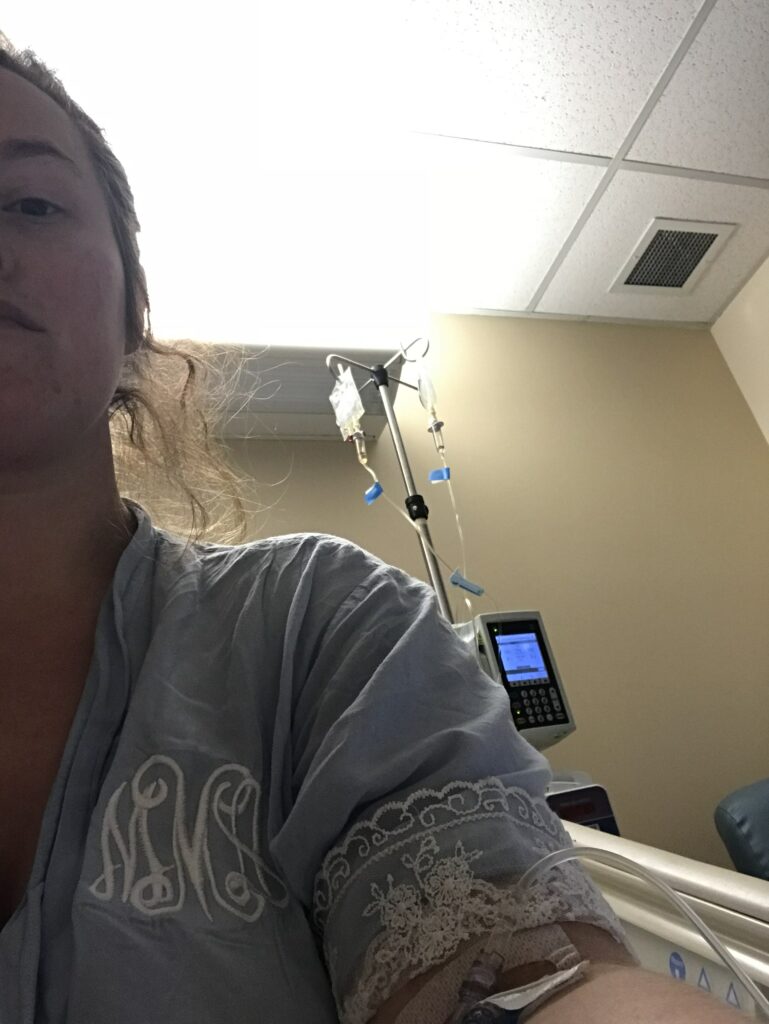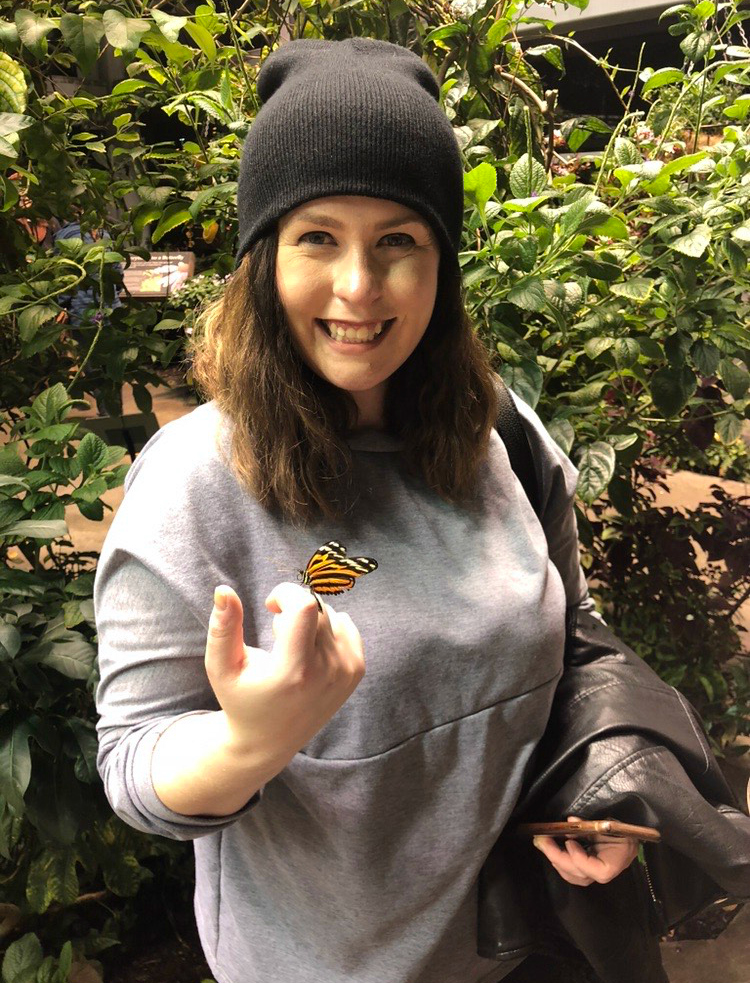
Posted by: The Sumaira Foundation in NMO, Patient.e, TM, Voices of NMO
 My biggest fear in life was that I would have some incurable sickness or disease.
My biggest fear in life was that I would have some incurable sickness or disease. Not heights, nor spiders, nor public speaking. It was getting sick. Both of my parents had a myriad of physical and mental illnesses throughout my whole life, which seemed to be getting worse as the years went on. My mother cannot walk without a walker and my father had been diagnosed with several autoimmune disorders. A lot of the time, I just wanted them to be normal and healthy like other parents I saw. But it was just how life was and I had to accept it. I was living your average 20-something year old, post-graduate life. I was going to the gym 5-6 days a week. I had a 9-5 office job. I had a good group of friends. And then all of a sudden, one day, my life was no longer normal…
It was June 2017. I went and got my hair cut and colored. I noticed after this particular visit, I had an extremely stiff neck. I thought I must have just had my head leaned back in the wash bowl for too long. Usually a stiff neck goes away, but a month later, it was still there! And man, was it annoying. But I just chalked it up to having the worst crick in my neck I had ever had and continued on with life.
At the end of July, I was driving to work when I was rear ended, and bad. It totaled my car. A few days went by and my neck began to really hurt. I also began feeling like my right leg and hip was going to give out on me. The doctor told me he thought I had whiplash and that it would eventually go away. He also told me he didn’t think there was anything wrong with my leg and was probably just sore from the impact. A month went by after no working out and taking it easy and my neck was feeling worse. My leg and hip weren’t getting any better. I also began experiencing numbness and tingling in my neck and my arms along with experiencing pain in my lower abdomen and bladder incontinence.
The next few months were spent going back and forth to different specialists only for them all to tell me nothing was wrong with me. I didn’t know what to do. Maybe it really was just whiplash and it would pass. But I couldn’t shake the feeling that this was something more. I distinctly remember telling my boyfriend during that time that I was scared this was going to be something serious, like an autoimmune disorder.
During this time, I tried to continue on like nothing was bothering me. But I started to feel extreme fatigue along with my other symptoms. I would almost fall asleep eating dinner. I would crawl into bed at 6:30 pm just exhausted. I had a difficult time holding my neck up and the tingling and numbness just got progressively worse. My brain was foggy and a lot of days I felt extremely fuzzy. I couldn’t turn my neck to the right and basically lost my range of motion entirely. I spent a lot of time researching on the internet things it could be. I was coming up with multiple sclerosis, lupus, or arthritis. All scary things that I desperately did not want. I began consulting with my friend, Becca, who is a chiropractor. She helped get the range of motion back in my neck and listened to my symptoms. She thought it was possibly Fibromyalgia, but advised that was very hard to diagnose. She advised me to establish a primary care doctor, which I did. She was great, but only could refer me to a rheumatologist. A new patient appointment was eight months away.
I woke up on a Friday morning in May of 2018. It was my next to last week at a job and I was beginning a new position in a little over a week. I looked down and noticed my right hand would not open all the way. It looked like a claw and I knew that wasn’t normal. I spent the next few days visiting the ER and my primary care physician.
They just advised I would need another MRI and I couldn’t get one scheduled for another few weeks. My arm began to draw up near my chest. At this point, I was completely defeated and terrified. I had been to the ER and primary care doctor and it was like no one was seeing my symptoms as being a big deal. I couldn’t use my right hand or arm at all at this point. My entire torso was numb and tingling. I couldn’t feel sensations in either hand. The gut feeling I had all these months was no longer a gut feeling. My body was on red alert. Thankfully, my roommate at the time, Rachel, could tell I was defeated and she decided to be my advocate. Rachel called her friend who was a physical therapist and she advised that I needed to go see a local physical therapist in the morning. The doctor could do some tests and then send a write up to the ER.
As soon as we got to the office the next morning, the doctor looked very worried. He told me it looked like I could possibly be having a stroke and sent me immediately to the hospital. They admitted me around 6 and then advised me they wanted to get several MRIs done and it would take hours. I remember being rolled down to the MRI machine and the radiologist advising they had specifically called her back into work for my scan. I remember laying in the MRI machine trying to lay completely still. But I couldn’t control my arm at this point. It was almost like it had a mind of it’s own. I remember laying there listening to the loud beeping and noises of the MRI machine, trying to sing songs to myself or count. Dosing in and out of sleep. I finally emerged 3 and a half hours later and was sent back up to my room. The hospitalist came in and said they had reviewed my MRIs.
She told me It was either cancer or a disease called transverse myelitis, a rare neuroimmune disorder where the immune system attacks the central nervous system. I held it together while the doctor explained all of this and as soon as she left the room, I burst into tears. So cancer or a rare autoimmune disorder. Here was my biggest fear coming to life at 27 years old. They started me on steroid infusions immediately and advised me I would be admitted for five days at the very least. I remember thinking, “Of course this happens and I am supposed to start my new job on Monday. What am I going to do?” Several friends came by to visit. I felt myself repeating the story over and over again. And telling everyone it was no big deal. Even though I had just received devastating news, I found myself trying to act like it was fine and I will get through it and telling everyone it was going to be okay. No one else was telling me it was going to be okay. I was telling everyone else that.
They told me officially, the diagnosis was transverse myelitis. Along with my lesions, I was also extremely deficient in Vitamin D and B-12. I was discharged from the hospital and went to my new job the next day. Looking back, that was one of the dumbest decisions I have ever made in my life. I was being advised by my family to not rest and to push through. I couldn’t lose this job and I had worked too hard and come too far. I also didn’t want to lose the job or the new benefits that came with the job. Especially with this new diagnosis, I was going to need all the assistance and benefits I could get. I just wish they would have told me I needed to rest and regain my strength.
I began occupational therapy after my work training was over. Since my arm was so damaged from the attack, I could not do things any normal person could do. I couldn’t write, hold utensils, button my clothes, open anything with a twist top, grasp or pick up anything. I also began having intense muscle spasms anytime I raised my arm or moved my arm in a certain way. I was angry and in pain. Angry because I pride myself on being independent and here I was not being able to do simple things like button my pants or shirts. I remember dropping my plate of food in the cafeteria at work because I couldn’t hold my drink and plate at the same time. I remember tearing off clothes in my bedroom because I was too frustrated I couldn’t button a shirt. I remember not being able to text on my phone because my hand was too tired. I remember every time I went to the restroom at work, hurriedly trying to unbutton my pants so I wouldn’t pee on myself. And instead I would have a spasm shoot through my system. I remember leaning against the bathroom stall with my entire body shaking, just waiting for the spasm to pass. I remember not being able to open a packet of food or jar of sauce by myself and just giving up.
But most of all, I remember the immense sadness and frustration I felt through all of this. I felt so alone and hardly confided in anyone. I went to work, went to therapy, came home, went into my room, and laid in bed. I barely talked to anyone because I was so mad and upset. This was NOT how I envisioned my life going. This was EXACTLY the sort of thing I didn’t want and was afraid of.
In late July 2018, two months after my hospitalization, my left leg started going numb. Since my diagnosis, I had spent a lot of time researching what was online about transverse myelitis and knew that attacks could cause paralysis. So, with my leg starting to go numb, I decided it was time I go back to the hospital. I was admitted again for another five days. This time I didn’t want all the visitors. I just wanted to sit there mainly by myself. I was beginning to walk with a limp, so I mainly just sat in the bed and watched TV, feeling sorry for myself. The doctors put me on immunosuppressant medication to try to get my body to chill out. They told me I would have to now be extra careful because I could get sick way easier now. I was discharged and purchased a cane. On top of my arms and hands still not being fully functioning, I was now having to hobble around work and town with a cane. I began incorporating physical therapy along with my occupational therapy.
I went into a deep depression. I was pissed at everything and everyone in my life. I dubbed everyone in my life as weak and that they couldn’t handle what was happening. My dad made the suggestion that I should try to get into the Mayo Clinic. I didn’t really want to go because I figured it would take months of waiting before I would be able to get in. And I just really didn’t care at that point. But I requested an appointment anyway and to my shock, they had an opening in a couple weeks at the Rochester location. The trip was to last five days and I was to meet with an array of specialists. My aunt came with me and we met with a neurologist who specializes in rare neurological disorders.
I had created a timeline of all the things I had been feeling since June of 2017. He listened, asked questions, and took notes for two hours. This was the longest I had ever spent with a doctor. My aunt sat there in shock listening to all the things I had been feeling over the past year. He did some tests, met with his superior, and advised he thought my condition was neuromyeltis optica, also known as Devic’s disease. And that I had been having flare ups for months. The big kicker was doing an antibody test, and seeing if I had the specific antibody in order to officially diagnose me. I did the test and tested positive for the antibody.
I remember having tears roll down my face while he was explaining that this was a lifelong disease. There was medicine to make it better, but it would not necessarily prevent relapses. I was relieved to finally have a name and official diagnosis from the most knowledgeable specialists possible. But I also felt incredibly sad that this was something I was going to have to deal with forever. There’s no cure. There is a mortality rate that increases depending on how bad the flare ups are. I could go blind or be paralyzed. I was going to have to learn to live and cope with my biggest fear coming to fruition. I returned from the Mayo Clinic and continued on with my anger and depression. While I was glad to have a diagnosis, it was still something that was difficult to process. I went back to my local neurologist and PCP and advised them of the diagnosis. They had never heard of it which is NOT comforting. I ended up having to advise my doctors about the disorder and how it should be treated.
I continued going to occupational and physical therapy and eventually gained back close to full mobility with my arms and legs. After about six months, I was able to write again. My spasms for the most part subsided and I wasn’t having to use my cane. I started feeling a bit more positive and a bit stronger. I did have good and bad days. On my good days, I was happy that I was not paralyzed or blind. I was grateful for the day as it was and wanted to start being happy again. I wanted to be my normal, mostly positive self that I was prior to 2017. But I also had very dark days. These days were filled with extreme anxiety and dark thoughts. These days I would just lay in bed and let myself be submerged in these negative thoughts. I would overeat to make myself feel better. I gained a ton of weight back that I had previously lost a few years prior. So on top of the sad feelings about my disorder, now I also felt sad about my appearance. I would look in a mirror and not recognize myself. Sometimes these feelings would last a day, sometimes a few days. But then, the happy days started becoming more frequent than the sad days. I don’t know what happened necessarily. Maybe it was my body having more good days than bad. But I knew that maybe, just maybe, this would make me a better person in the long run. It wasn’t an epiphany I had one day or anything like that. It wasn’t a moment where I just told myself I needed to snap out of it. It was a gradual process that took months.
 Since 2018, I have had a few more flare ups, some require the assistance of a cane. But with each flare up, I find myself being less angry. I’m trying to remain positive. I’ve decided to be a part of a research grant at Mayo Clinic where they study people with NMO. One day, they will find a cure or find a medicine that will make flare ups go away and maybe, it will be my samples who help discover that.
Since 2018, I have had a few more flare ups, some require the assistance of a cane. But with each flare up, I find myself being less angry. I’m trying to remain positive. I’ve decided to be a part of a research grant at Mayo Clinic where they study people with NMO. One day, they will find a cure or find a medicine that will make flare ups go away and maybe, it will be my samples who help discover that.
Throughout this journey, people tell me I’m strong. I hate that, actually. I don’t feel strong a lot of days; this is just something I have to deal with. I hide myself at my worst. And on my best days? I just want to be normal and do normal things. I’m still trying to find normal. I’m going to therapy and trying to work through things.
I wanted to write my story because I wanted to provide a realistic view of someone dealing with NMO. It’s not always gold at the end of the rainbow or light at the end of the tunnel. And that’s OKAY. I have learned that while I do have people I can reach out to, the main person I have to reach out to is myself.